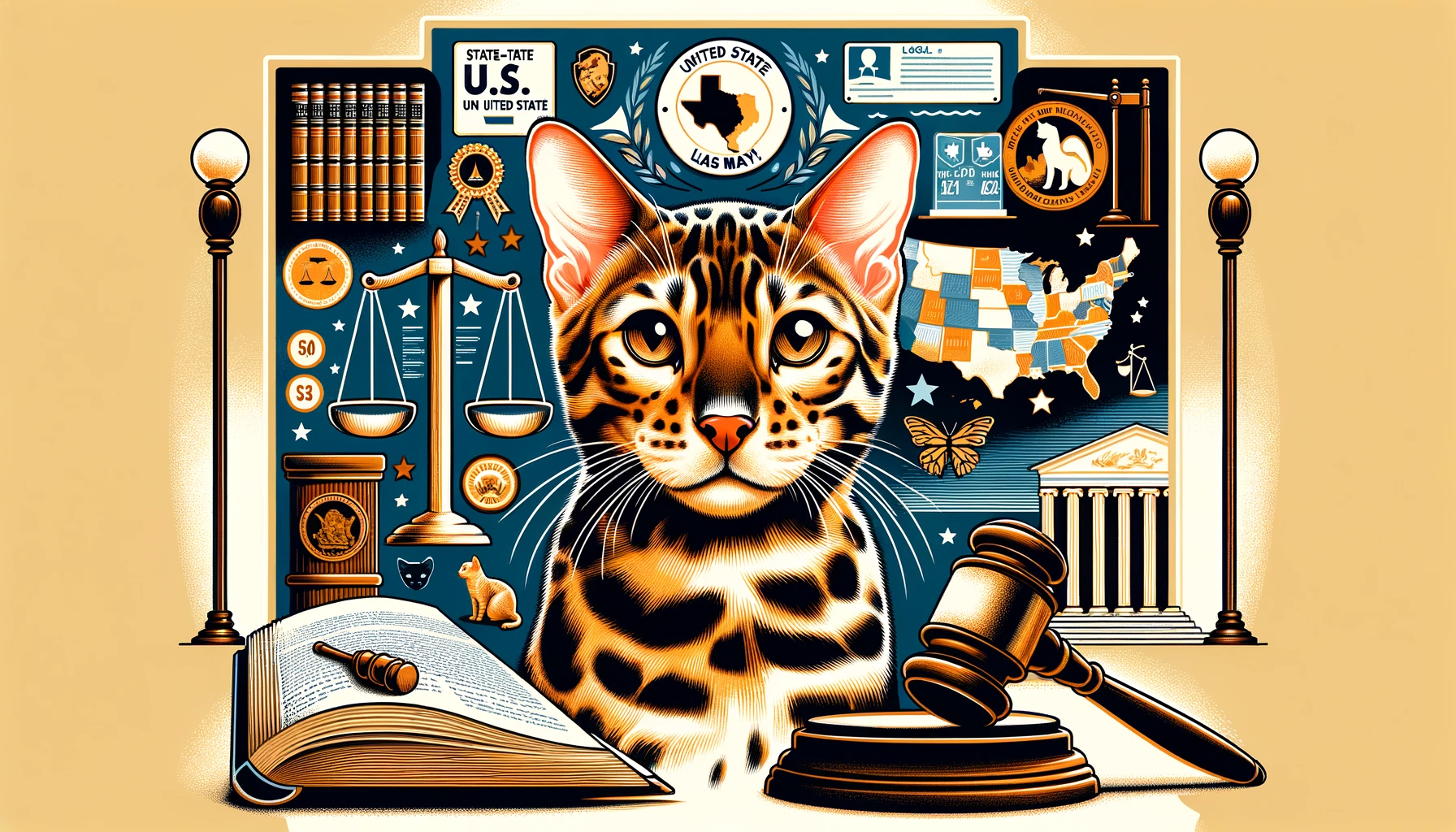Bengal cats, known for their wild, leopard-like appearance, are a hybrid species created from the crossbreeding of domestic cats and the Asian leopard cat. While admired for their striking appearance and dynamic personalities, Bengal cats face legal restrictions in several U.S. states. This article explores the reasons behind these legal constraints, focusing on public safety, environmental concerns, and the protection of native wildlife.
Legal Background
The legality of owning Bengal cats in the United States varies by state and is primarily influenced by the cat’s generation relative to its wild ancestor. Typically, F1 and F2 generations (those closest to their wild ancestors) are more strictly regulated than F3 and beyond, which are considered more domesticated.
Federal Regulations
The U.S. does not have a unified federal law that bans Bengal cats outright; however, the U.S. Fish and Wildlife Service regulates the ownership of hybrids involving endangered species under the Endangered Species Act. Since the Asian leopard cat is listed, certain implications apply nationally.
State Laws
Different states have implemented varying regulations regarding Bengal cats:
- New York and Georgia: Possession of Bengal cats is illegal, with penalties including fines and confiscation of the animal.
- California and Hawaii: Laws are designed to protect local ecosystems, prohibiting the ownership of certain hybrid animals, including early-generation Bengal cats.
- Alaska: Focuses on the potential threats posed to local wildlife by non-native species, including predatory behavior by Bengal cats.
- Alabama: No specific laws regulating Bengal cats.
- Alaska: Permits may be required for certain hybrid cats.
- Arizona: No specific regulations on Bengal cats.
- Arkansas: Regulations vary by local jurisdiction.
- Colorado: Generally legal, but some cities may have restrictions.
- Connecticut: Legal to own without a permit.
- Delaware: Bengal cats are legal to own.
- Florida: Permits required for early-generation Bengals.
- Idaho: No specific state-wide regulations.
- Illinois: Legal, but regulations vary by locality.
- Indiana: No specific state-wide laws.
- Iowa: Legal to own without restrictions.
- Kansas: Legal to own, some local restrictions may apply.
- Kentucky: No specific state-wide laws.
- Louisiana: Bengal ownership is legal.
- Maine: No restrictions on Bengal cats.
- Maryland: No specific state-wide laws.
- Massachusetts: Legal to own, but local restrictions may apply.
- Michigan: Legal without restrictions.
- Minnesota: No restrictions on Bengal ownership.
- Mississippi: No specific state-wide laws.
- Missouri: Legal to own without restrictions.
- Montana: No specific regulations on Bengal cats.
- Nebraska: No specific regulations.
- Nevada: No restrictions on ownership.
- New Hampshire: Legal to own without restrictions.
- New Jersey: Bengal cats are legal to own.
- New Mexico: No specific state-wide laws.
- North Carolina: Regulations vary by county.
- North Dakota: No specific state-wide laws.
- Ohio: Legal, but regulations can vary locally.
- Oklahoma: No specific regulations.
- Oregon: No specific state-wide laws.
- Pennsylvania: Legal to own without restrictions.
- Rhode Island: Bengal cats are legal to own.
- South Carolina: No specific state-wide laws.
- South Dakota: No restrictions on Bengal cats.
- Tennessee: Legal to own without restrictions.
- Texas: No specific state-wide laws, but local laws may vary.
- Utah: No specific state-wide laws.
- Vermont: No restrictions on ownership.
- Virginia: Legal to own, some local restrictions may apply.
- Washington: No specific state-wide laws.
- West Virginia: No specific state-wide regulations.
- Wisconsin: Legal to own without restrictions.
- Wyoming: No specific regulations.
Reasons for Regulation
Public Safety
Early-generation Bengal cats can exhibit unpredictable behavior, which poses potential safety risks to owners and the community. This behavior can include increased aggression, a strong prey drive, and difficulty in typical domestic containment.
Environmental Concerns
Bengal cats, particularly those closer to their wild lineage, may pose threats to local wildlife due to their hunting instincts. States like California, with diverse and sensitive ecosystems, regulate these animals to prevent potential ecological disruptions.
Protection of Native Wildlife
Hybrid animals, including Bengal cats, can sometimes escape and establish feral populations, leading to significant impacts on local fauna. Regulation helps mitigate the risk of such ecological impacts.
Legal Challenges and Controversies
The regulation of Bengal cats has been controversial. Advocates argue that well-socialized Bengals pose no more risk than typical domestic cats and contribute positively to biodiversity. Critics, however, emphasize the unpredictable nature of hybrid animals and the potential long-term ecological consequences.
Conclusion
The legal status of Bengal cats in the U.S. reflects a complex balance between animal rights, public safety, and environmental protection. As understanding and breeding practices of Bengal cats evolve, legal standards may adjust to reflect new insights and technologies.
References
- U.S. Fish and Wildlife Service, Endangered Species Act: [https://www.fws.gov/endangered/]
- State of California, Department of Fish and Wildlife: [https://wildlife.ca.gov/Conservation/Laboratories]
- New York State, Department of Environmental Conservation: [https://www.dec.ny.gov/]









Leave a Reply